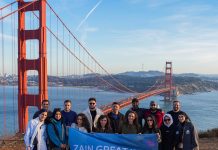
Vodafone has joined Good Things Foundation’s National Databank to provide free data for the charity’s network of community groups across the UK and the people they support.
It has pledged 24 million gigabytes of data, enough to provide connectivity to 200,000 people for six months. Vodafone has worked with Good Things Foundation on digital exclusion projects since 2020 and this initiative is part of its commitment to connect one million people living in digital poverty by the end of 2022.

Good Things Foundation’s National Databank gives community groups across the UK access to free data – either through SIM cards or vouchers – that they can share with those who are digitally excluded and need support. Following a successful three-month pilot that saw over 400 data vouchers distributed to community partners, the programme is now live in 34 centres across the UK with plans to extend it to hundreds more during 2022. Community groups who are already a part of the Good Things Foundation’s network can apply for the connectivity later this month using the Online Centres Network section of the charity’s website.
The pandemic has highlighted the scale of digital exclusion, with the greatest impact felt by the most vulnerable in society. 1.5m households in the UK, or approximately 6% of the population, live without internet access. A recent report from Vodafone highlighted how the digital divide most impacts those who are already at a disadvantage, either financially or socially.
Ahmed Essam, Vodafone’s UK CEO, commented: “We’ve put tackling digital exclusion at the heart of our business with our pledge to connect one million people by the end of 2022. Joining Good Things Foundation’s National Databank is an important milestone in achieving this target and another great way to provide connectivity to grassroots organisations who can have immediate impact in the communities in which they work.
“Together, we can tackle digital exclusion.”
Helen Milner OBE, Group Chief Executive, Good Things Foundation, said: “We’re delighted to welcome Vodafone to the National Databank. The pandemic has exposed and exacerbated the digital divide, highlighting a huge pressing social issue and leaving people with multiple social challenges left behind. It is not OK to leave millions of people locked out of the digital world.
“Vodafone has done some fantastic work over the last year to help these digitally excluded people get online; and with this generous pledge we can now reach many more organisations and the communities they support.
“We’re excited to see the National Databank grow in scale in 2022, increasing from 34 participating centres to hundreds, possibly thousands, more.
“Our aim is to drive collaboration between public, private and community sector organisations and deliver sustainable solutions that will ultimately end data poverty in the UK by 2024. This is a real possibility. Together, we can all come together to break down the barriers causing data poverty in the UK once and for all.”
Vodafone also announced that its charities.connected initiative has received applications for more than 112,000 SIM cards from 1,180 organisations, once again highlighting the extent of digital exclusion across the UK. Charities.connected launched in August and gives every registered charity the opportunity to apply for free connectivity to improve its digital capability or help the individuals and families it supports to get online. Organisations who have applied to date support a huge range of social causes, from domestic abuse and homelessness to healthcare and learning disabilities. Charities can continue to apply for the free connectivity.
Lola is a survivor of modern slavery. The trauma that she lives with as a result of her exploitation and abuse is challenging, and she has been diagnosed with Complex Post Traumatic Disorder, severe anxiety, depression and panic attacks that significantly affect her daily life. Lola needs to be in constant touch with her solicitor trying to resolve her right to stay in the UK, as well as to be in touch with her GP to help with her mental health problems. Lola has sometimes been forced to make the choice between buying data or food. The data she now receives through the National Databank has taken away these obstacles. She can now reach out to friends and support workers with more freedom, as well as access resources online to calm her distress. She says: “The data has helped me because I can speak with my friends and people I know without thinking about how many minutes I’ve used up. It takes the worry away.”
For Paul, who experiences many mental and physical health challenges, mobile data is the only thread that connects him to his family and vital health services. Without it, he is completely isolated. The National Databank data voucher has taken away some of Paul’s loneliness and made him feel more positive. “Every little bit of data helps in helping me stay well and connected to the outside world,” says Paul.
Originally from Syria, 41-year-old Amir’s family is always struggling to make ends meet – sometimes it’s hard to even put food on the table each day. Amir was unable to afford any data to use the internet, but through the National Databank programme the whole family has benefited. Amir has been able to reach out to employers and make new contacts and his children have been able to access the internet for educational purposes. “The vouchers have been invaluable in helping the whole household on a day-to-day basis,” says Amir.









